I can't remember when I started reading Dykes To Watch Out For (DTWOF) -- I know the "maximum authenticity" answer is to say I read the strip in my local gay newspaper, but Rochester's The Empty Closet didn't carry it. I probably started reading the strip online via the Planet Out website sometime in the late '90s. I eventually bought two of the Firebrand collections (The Sequel and Post-Dykes) and read the rest of the collections in bookstores like Barnes & Noble or Borders. I was lucky in this regard -- Rochester was close to Firebrand's headquarters in Ithaca, and my local Borders ran a Triangle Talk gay reading series and probably had some queer folks on staff. I kept up with the strip until around 2006 or 2007.
While I knew queer people in my so-called real life, this strip was how I knew and kept up with lesbian culture. Its tenure and position in the community papers and websites gave it a certain sort of authority and, as a trans woman barely aware of herself as trans, this sort of media was one of the few avenues available to experience the culture of Gay Women in America.
I recently (re)-introduced a friend to Bechdel's memoir Fun Home, and I decided to do a deep dive into the old DTWOF strips to see how it did on Trans Things™. My memory was that Bechdel was never cruel and that mostly holds up -- but the full reality ends up being a bit more complicated.
It only takes two strips (into the '87 reboot) for trans folks to show up as a punch line -- Mo bemoaning a bad haircut by saying she looks like a transexual marine

But then nine episodes later we get a panel with a fuck gender cohort used as an example that pride hasn't lost its edge.

As the strip goes on it will be hard to determine a clear point of view on most of the issues it tackles. Bechdel's standard approach to politics (whether civic or personal) is to have her characters take up the various talking points that existed in the lesbian discourse of the time.
A '92 strip on the characters reacting to a friend "going bi" is a good example of this
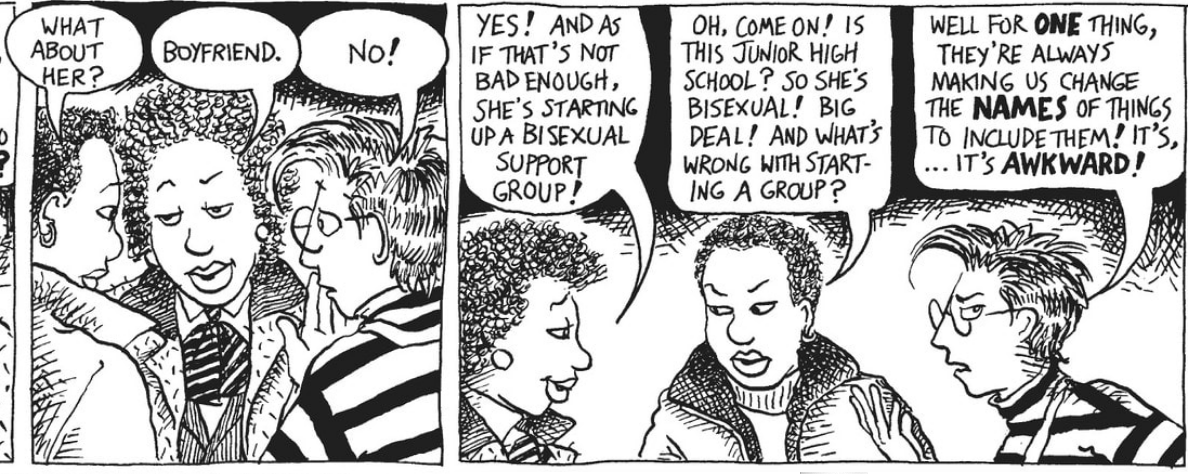
Bechdel has talked about how Mo was, early on, a self-insert character, but that as time went on she realized all her characters embodied some aspect of herself. When another panel features someone pinning up a flyer for the Lesbian, Gay, and Bi Equal Rights march it's hard to know what to make of the half-obscured flyer for "transgender contra-dancing" underneath.
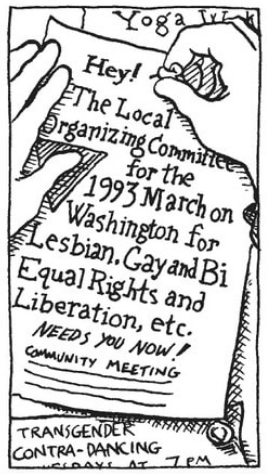
Is this Bechdel lightly hinting to the community that there's still work to be done? Or hinting that Mo's right and if we're not careful the LGB might become (gasp) LGBT? It's easy to round up or down depending on your mood. During her promotional tour for Are You My Mother Bechdel talked about her personal challenges around subjectivity, and losing her point of view as soon as she enters social relations with other people. Knowing all that it's hard for me to read the above as anything other than a slightly dissociative observation about the state of inclusion of trans folks in the wider queer community without making a concrete statement one way or the other.
Explicit trans women are few and far between in the strip. Most famously, perhaps, is the character of Jillian. She's drawn in one panel, features in two main strips, and then pops up again in a commission for Leslie Feinberg's Transgender Warriors

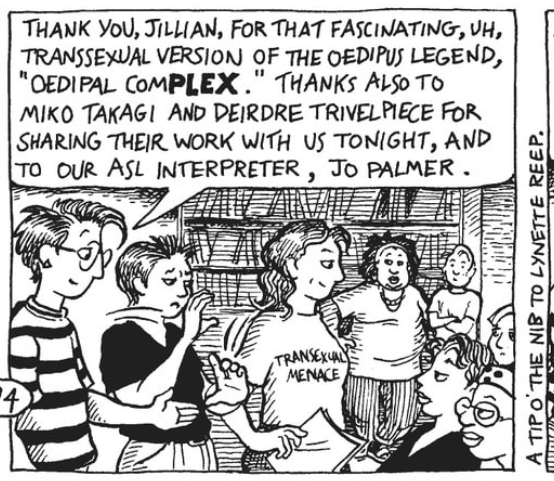
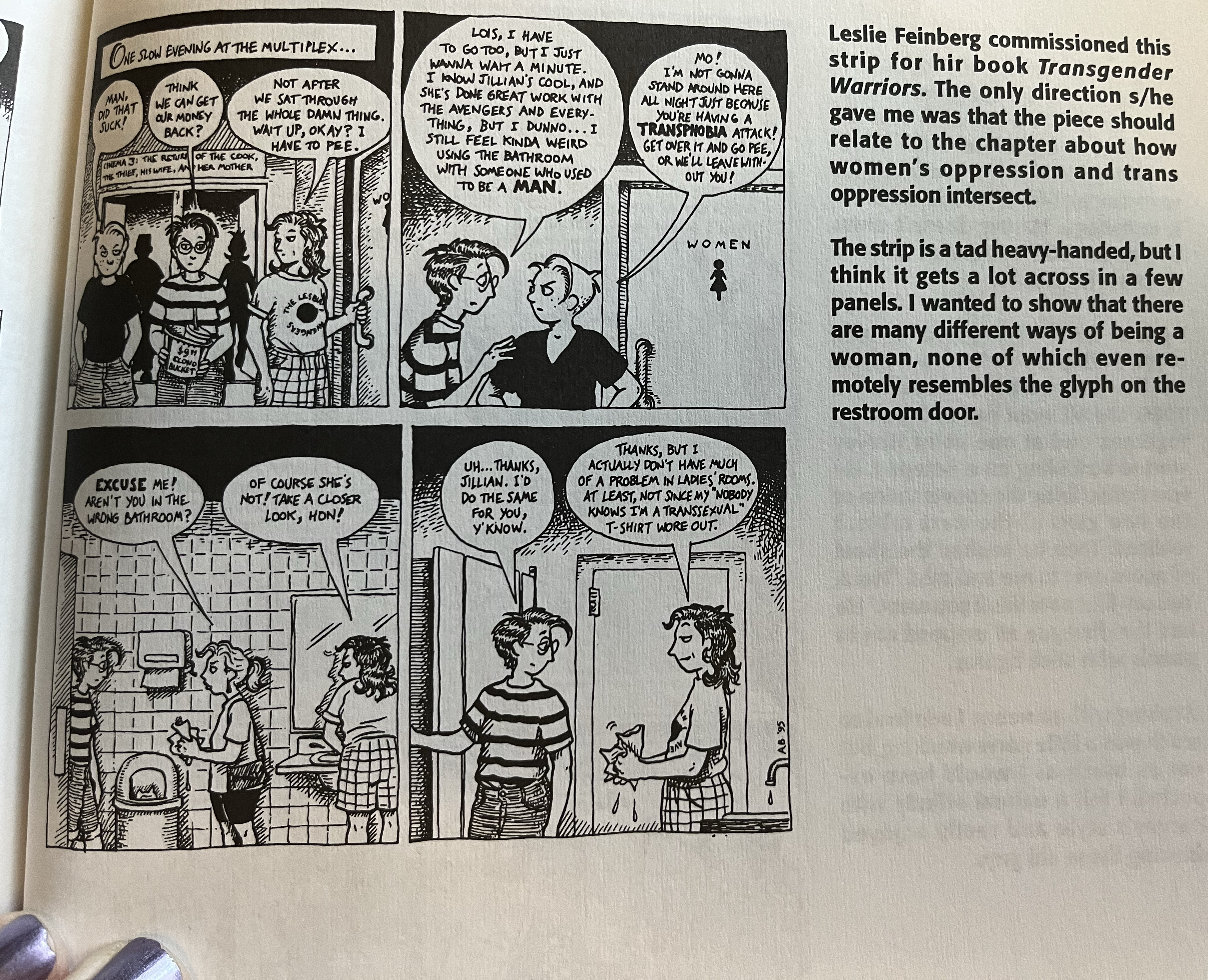
The reprinting of the Transgender Warriors commission strip in 1998, with author comments, makes it clear that Bechdel's views on gender are at a point where trans women are women -- but Jillian's older appearances still have an ambiguity. Mo's talking points were just in the air back then, and even though she's scolded by Lois and allows Jillian to read at the event (looking great in a Transexual Menace shirt, btw) -- we still get another dyke confronting Mo about trans and bi women.
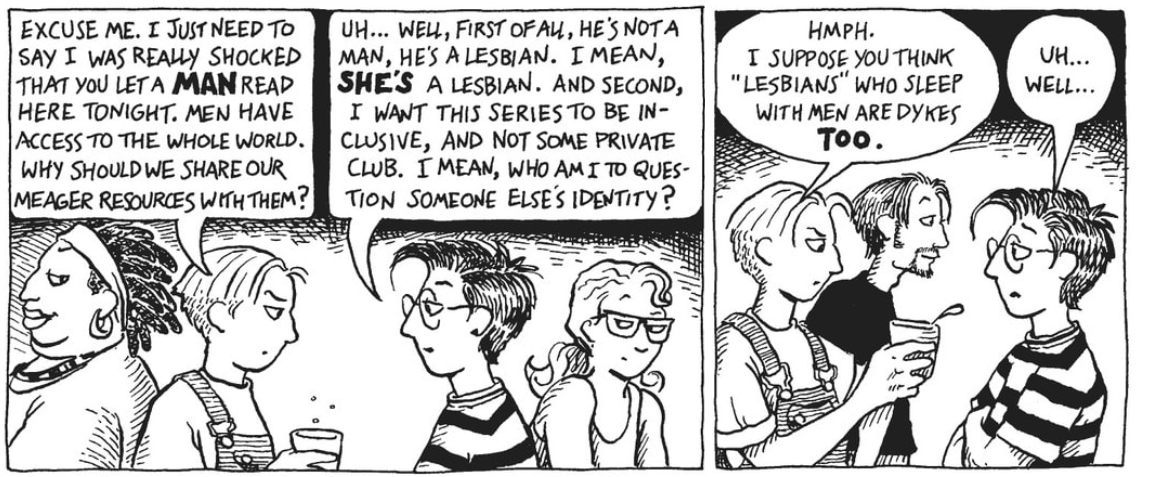
Mo freezes with a not-yet classic For Better or For Worse stammer and is saved from having to make a statement.
After that Jillian, and trans women generally, are absent from the strip for a while. As the years go on Bechdel does end up mentioning and exploring gender from a more genderqueer and trans masc perspective via Lois. She will often show up with gender non-conforming lovers,

ends up becoming a drag king,

and even hooks up with a trans masc. fag (complimentary)
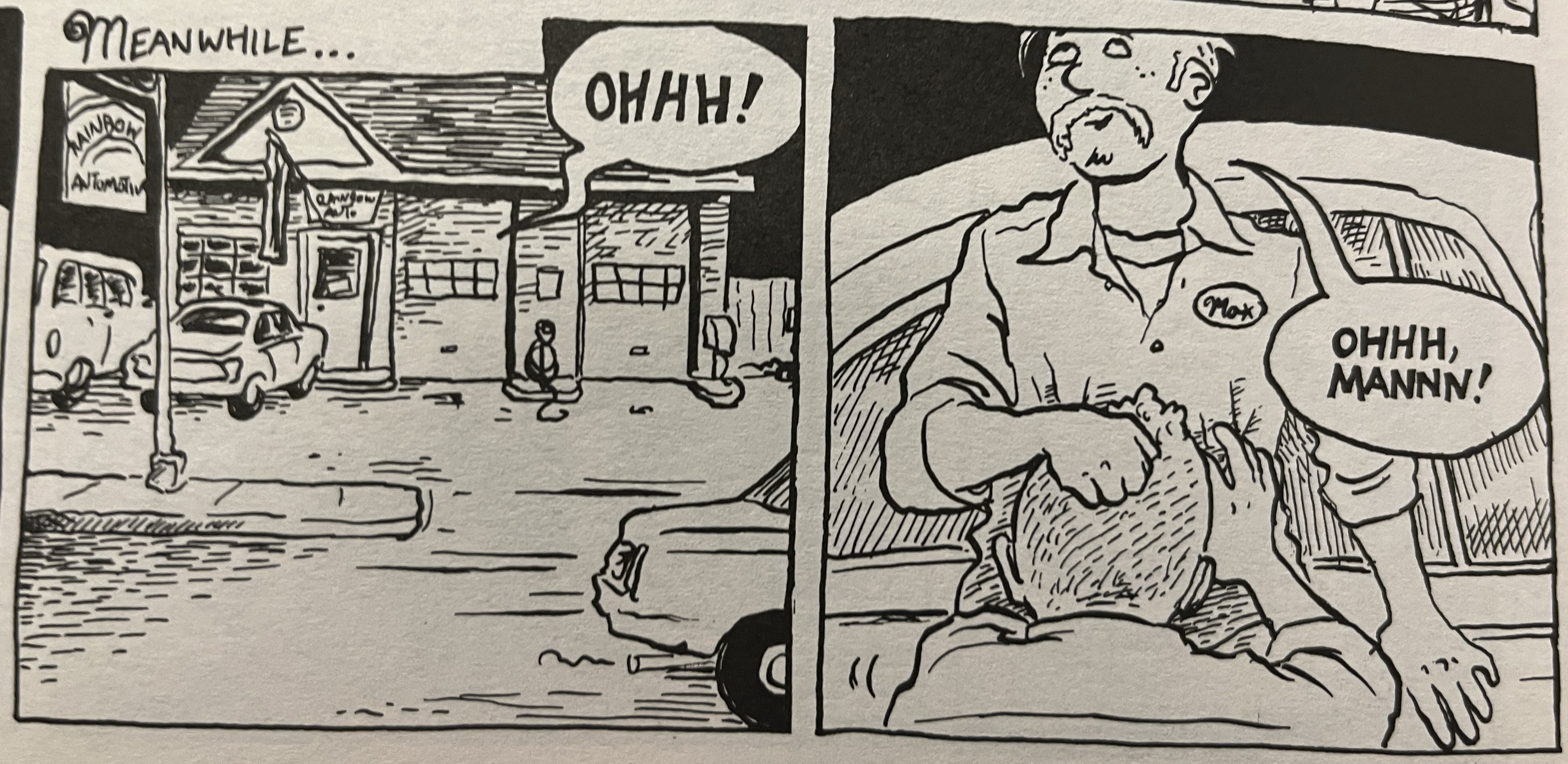
Trans women won't show up again until the introduction of Janis in the summer of 2001.

A trans kid showing up in media nearly twenty-three years ago is as wild as it is radical. It wasn't immediately clear that Janis was going to end up a trans girl -- she was treated as male at her introduction and the focus of her years-long arc was the challenges the adults felt in how best to support her.
Again, Bechel's approach to presenting the debate means no one take on the issue emerges. Lois, unsurprisingly, is super supportive of Janis and, as a result, ends up in her first real committed relationship with Jasmine, Janis's mother. Jasmine is clearly having trouble accepting her daughter and ultimately partially supports her. Stuart, of all people, is the least accepting of things and the slowest to come around
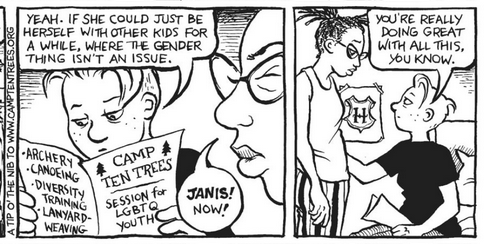
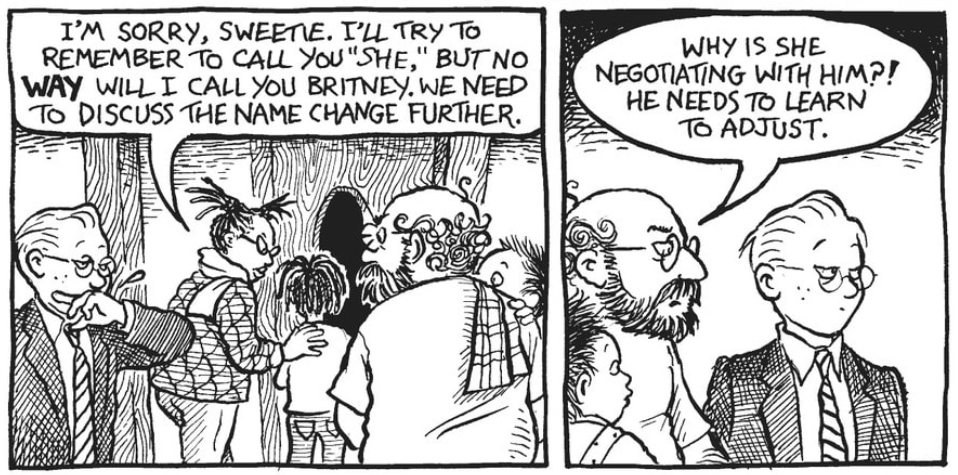
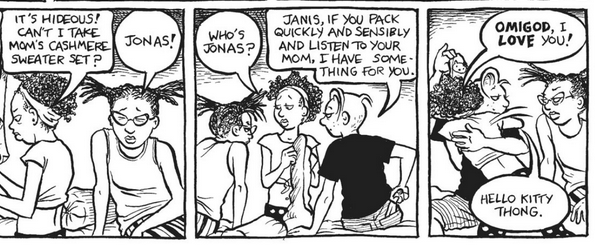

Looking at Janis's arc it is remarkable to see how far DTWOF has come in its depiction of trans people from that first joke about the transexual marine. Knowing a bit about how fiction is made it doesn't seem like a huge leap to say that Bechdel knew where she was heading with Janis. A depiction of a trans girl in George W Bush's America is remarkable and should be applauded. (it's also worth noting the title Your Children are not Your Children comes from poet Kahlil Gibran)
And yet, as powerful as it is to see such an early depiction of support for a trans kid, the dykes of the strip never really need to contend with adult trans women on a regular basis or as equals. We simply don't come up. We just weren't a part of that world or that culture -- the '90s were a lonely road to walk for gay and queer trans women.
Like so much media the stories of trans women told in Dykes to Watch Our For aren't our stories, they're stories where people's reactions to us are centered. You can see this again in this Janis and Lois interaction

Janis DIYing androgen blockers as puberty blockers is an epic move -- but the focus of the strip isn't Janis overcoming her Mom's transphobia, it's how flabbergasted this leaves the normally unflappable Lois.
I don't necessarily see that as a failure of Bechdel's, but it is a broader failure of the lesbian culture that came out of the 70s, 80s, 90s, and even 2000s. And it's easy to say that it was complicated -- I was there as an adult by the '90s and it was complicated -- but almost every simplification and compromise around those complications came at the expense of trans women. And that, as I sit here in 2024 remembering the ways I tried to contort myself into the gay and lesbian communities who were never going to help me find myself, is still a hard thing to sit with.